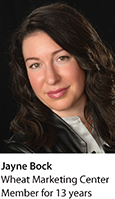 Q: What is your current position and what type of work do you do?
Q: What is your current position and what type of work do you do?
A: I’m the technical director at the Wheat Marketing Center in Portland, OR. We serve as the education and research bridge connecting wheat growers and end users, and I oversee the research and technical programs that we deliver in pursuit of this objective.
Q: When and how did you first decide you wanted to work in cereal grain science?
A: I initially thought I wanted to be a veterinarian, throughout most of high school…until I realized I didn’t care for the sight of blood. With the discovery of that bit of self-knowledge, I made the decision to go into feed science at Kansas State University instead.
Q: How have you been involved with the Cereals & Grains Association? How has your involvement with the association enriched your career?
A: My involvement started as a graduate student in the scholarship program. Over time I built relationships with mentors in the AACCI — Cereals & Grains Association who encouraged me to take a more active role in the organization through technical committees, award committees, divisions, and advisory boards. I’ve met colleagues and peers along the way who have been my champions and mentors, as well as many who have become friends and connections in the wider industry.
Q: In 2019, Cereal Foods World (CFW) is focusing on the global food system (GFS). Please offer your perspective on how global societal and technology trends are affecting cereal science and the cereal grain industry overall? How will cereal scientists need to adapt to these global trends?
A: Wellness activists and trends will continue to shape whether grain is good or bad in the eyes of consumers, for better or for worse. Cereal scientists will need to learn how to combat this by distilling responsible science down to an easy-to-digest format for consumers. Getting that messaging out to consumers means getting comfortable with social media.
Companies will increasingly have to be responsive to questions that regulatory authorities and consumers have about issues like pesticide residues, genetic engineering, manufacturing practices, food safety concerns, and environmental impact, among others. The old approach of “what you don’t know won’t hurt you” is no longer applicable or acceptable, and cereal scientists will need to be prepared to modernize at almost every point in the food production and manufacturing process to meet these challenges.
One final note, artificial intelligence and blockchain technologies will push manufacturing and research in new directions. Early adopters will likely find themselves in better positions as these types of technologies become a requirement to remain competitive.
Q: This issue of CFW explores Innovation and Product Development, from farm to fork, in the context of the GFS. Do you have any perspectives on the challenges and opportunities associated with the global expansion of the food chain and the dynamics of the global food trade?
A: Meeting global food production targets over the next few decades, while keeping food accessible and affordable, will be a major concern, especially in light of the challenges posed by climate change. Major technological advancements will be necessary and will present opportunities to innovate the way we produce, process, and distribute food throughout the global supply chain.
Q: What’s next for you?
A: I’ll continue building on the framework that Jon Faubion has helped put in place for CFW. We’ve seen some major upgrades to the look, delivery, and content in CFW during his tenure as editor-in-chief. Some of the items we’ll be targeting in the next 12–24 months, during my time as editor-in-chief, will be solidifying the social media strategy for CFW, as well as delving into complementary modes of content delivery—like podcasts!—for high-interest topics.
